At first glance, the two pay-per-click advertising platforms appear remarkably similar. When allocating your budget though, it’s crucial to have a deeper understanding of Google Ads vs Facebook.
First, you need to understand your own advertising goals. Then, the pros and cons of both advertising networks, so you can use either tool to your greatest success.
Facebook vs Google Ads: Understand Your Goals
You need to get clear on two things about your advertising strategies before deciding on a cost-per-click network. First, you need to decide what your goals are for your campaign. Then, how much you are willing to pay per conversion.
How much you are willing to pay per conversion may be the same no matter what your goal is for your campaign, but sometimes that may be different for you.
For example, sometimes you are looking for the great return on investment (ROI) within 30 days of starting a campaign. Other campaigns may be run for the purpose of building brand recognition and long term reach.
Which best describes your current goals?
It is also useful, when understanding your campaign goals, to get clear on what stage of the buyer journey you are attempting to target the customer. More information on that will be described below, but consider this now so you have it in mind as you make your decisions.
What Is a Google Ad?
Google Ads is a tool that allows advertisers to place their advertisements on the Search Engine Result Pages (SERPs) for searches performed on Google, as well as Google Shopping ads, the Google Display Network, and YouTube. This tool used to be known as Google Adwords.
Most advertisers use Google Ads in order to get their company shown on the results pages or on Google Shopping.
When creating an advertisement for the search engine results pages, advertisers will mainly target their ads based on keywords. So, when a user performs a specific search, they will see an advertisement targeted to them. Here is an example of a google ad on the search engine results page:
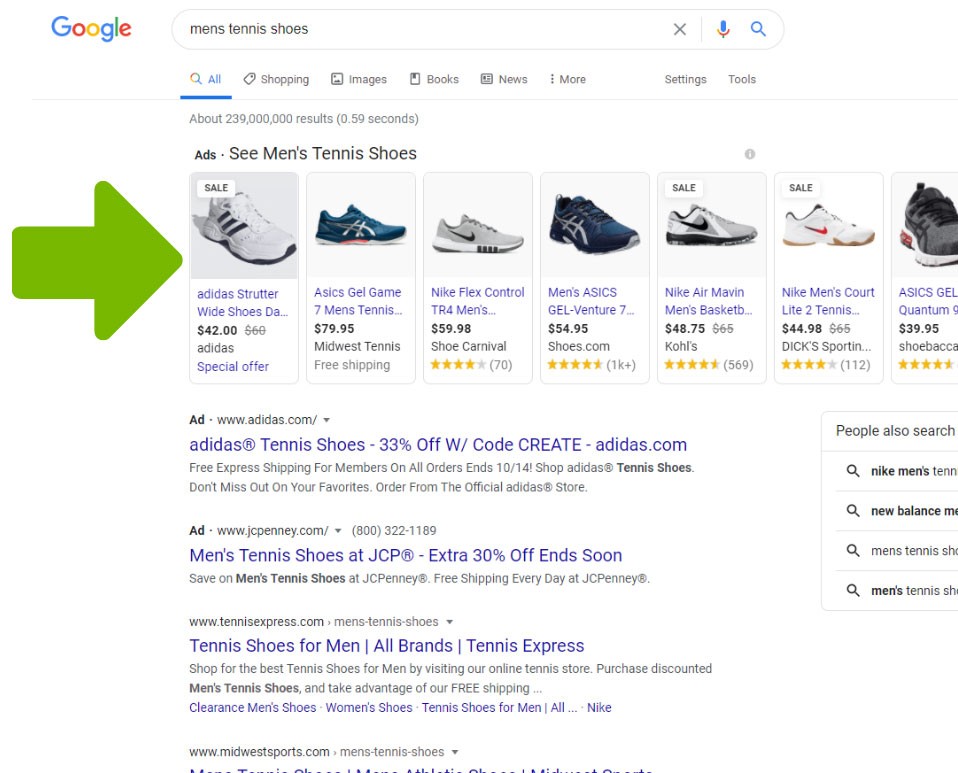
Advertisers who consider user-intent can do well here. When choosing keywords, advertisers consider what the user is looking for when performing that search. Sometimes, a user may be in need of content. Other times, they may be looking to make a purchase. By writing ad copy and linking to exactly what the user is looking for, an advertiser can use Google Ads to reach their target audience at exactly the right time.
With Google Shopping, advertisers are able to show off their products right when a customer is looking to buy a physical item. Keep in mind that Google Shopping only sells physical products. Also, advertisers won’t be able to enter keywords the same way they would with search engine result ads. With this tool, advertisers enter in their product information and users will get results based on what they are looking for. Filling in as much useful information about a product as possible can be useful. For instance:
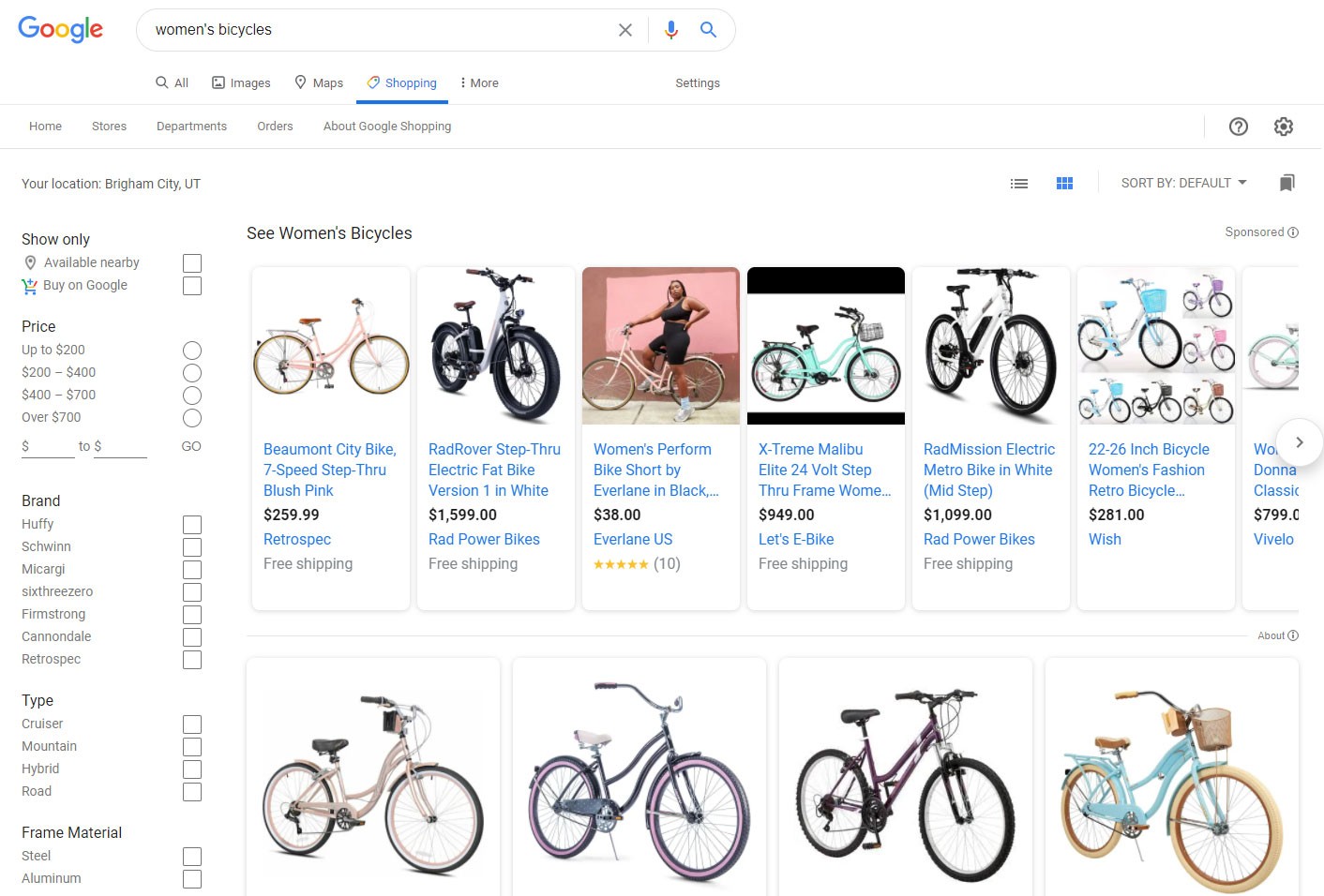
Advertisers can also narrow down their audiences by using specific targeting options. For example, ads can be created that target users who perform a keyword search but are also located in a specific place, are using mobile or desktop, or are part of a certain demographic like gender or age range.
They also have a remarketing tool and a tool to create audiences similar to ones that have interacted with past ads.
You Might Also Like
Google Ads has been around since the year 2000. Over the decades, this tool has grown and been refined to a more sophisticated advertising network with tools for targeting audiences and strategic bid management.
What Is the Platform for Facebook Ads?
Facebook Ads Manager is the advertising platform for all of Facebook’s websites, including Facebook itself, Instagram, and WhatsApp.
Advertisers on Facebook are catching users while they are going about other activities. While scrolling through Instagram looking for posts from their friends, family, or their favorite brands, advertisements will appear in their feed.

When creating an advertisement in the manager, advertisers can select a targeted audience.
Facebook has a lot of information on their users. When a Facebook user creates a profile, they tell the social network things like their age, location, and marital status. While users do this so they can share that information with their friends, Facebook can use it to help advertisers reach the right audience.
Users on this social network are highly interactive. They engage with pages on specific interests. They login to their account when they are traveling. They add information on their profiles as they go through different life events.
When using Facebook Ads Manager, advertisers can then create targeted audiences based on things like location, demographics, life events like engagements, graduations, or weddings, marital and parental status, interests, and certain behaviors. For example, a targeted audience can be created with information on behaviors like traveling or digital behaviors like interacting with certain pages.
This allows advertisers to create specific target audiences.
We can set-up and optimize your Google Ads for you but let’s also test your website’s SEO potential. Takes 60 seconds!
Paying for traffic is an important way for many businesses to grow but ranking naturally in Google for your important keywords is free. While Diib helps 1000s of businesses grow with Google Ads management, Diib is also one of the best SEO tools in the world and uses the power of big data to help you quickly and easily increase your traffic and rankings. Diib will even let you know if you already deserve to rank higher for certain keywords. As seen in Entrepreneur!
- Over 500,000 global members
- Keyword and backlink monitoring + ideas
- Built-in benchmarking and competitor analysis
- Easy-to-use automated SEO tool
- Speed, security, + Core Vitals tracking
- Too busy for SEO? Diib’s Growth Experts can set-up and optimize your ads!
Used by over 500k companies and organizations:
Syncs with 
For businesses with established audiences, there are two powerful features in the ads manager: remarketing and Lookalikes.
Remarketing audiences is where an advertiser targets Facebook users that have already engaged with their website or Facebook profile.
Lookalike audiences are created using information based on a current customer base. For example, many businesses take their newsletter list and enter the email addresses on Facebook to create a Lookalike audience of users with similar interests and behaviors to the users associated with those email addresses. Take a look at this Facebook ad:
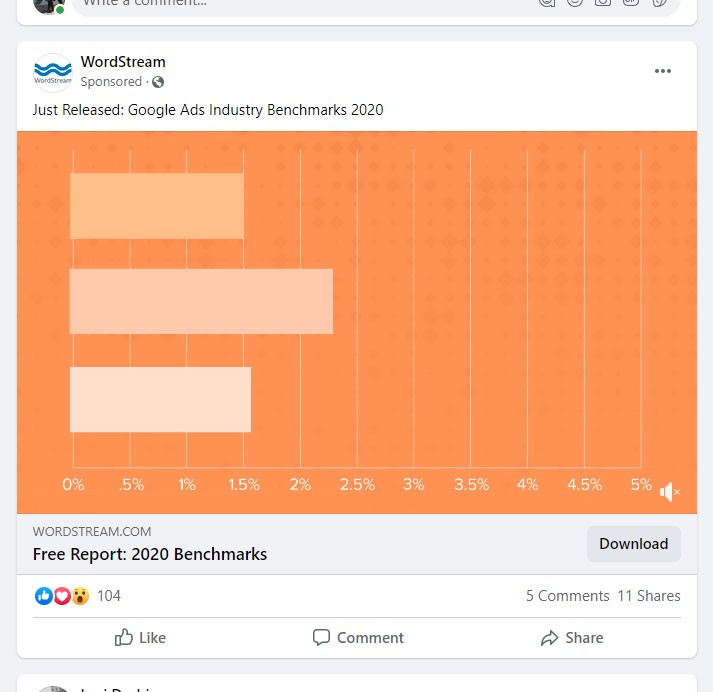
Another powerful factor when using Facebook ads are visuals. Facebook ads can be created using pictures or videos. In many industries, like fashion or food, audiences will become more engaged with strong graphics in a campaign.
What You Need To Run A Successful Campaign On Either Google Ads or Facebook Ads
When using either of the networks, advertisers need to be sure their ads are strong. While there are tips to be used to create the best ads on either platform, the following tips are true of both.
- Use strong ad copy
- Be regularly maintained and optimized for best performance
- Lead to an effective landing page, preferably with proven results
- Have well-targeted audiences
- Effective bidding techniques
How To Know: Is Facebook or Google Ads Better For My Company?
First of all, this is the right question to be asking. It isn’t about which platform is better. The question is about which platform is better for your business.
However, the answer may still be a blend of the two. This is because your company will likely run different campaigns with different end goals. Since each platform has its own strengths, you may need to use different tools to reach your different goals.
For many businesses, the best answer is to learn the strengths and weaknesses of FB Ads vs Google Ads and then use each tool accordingly.
Keep in mind as you read through the advantages and disadvantages of each option below that the lists are in comparison to each other. So while Facebook has a large audience, especially compared to most pay-per-click advertising options, when comparing Google Ads vs Facebook, Google has a much wider reach. So the audience size of Google is an advantage over Facebook, even though Facebook is still a massive audience.
The Advantages Of Google Ads
- The biggest benefit for Google Ads is user-intent. While Facebook users are browsing for memes or updates from their loved ones, Google users have the ability to see ads targeted to what they are current searching for. Catching a buyer right when they are looking to make a purchase is a powerful advantage. With content marketing, offering content that meets the need of the user is a strong way to build trust as an authority source. Advertisers would do well to consider where in the customer journey they want their ads displayed when choosing between Facebook and Google Ads.
- Their analytics tools are advanced. When it comes to managing bids and improving performance, Google Ads has more advanced features for optimizing ads. Here is an example of Google’s analytics tools:
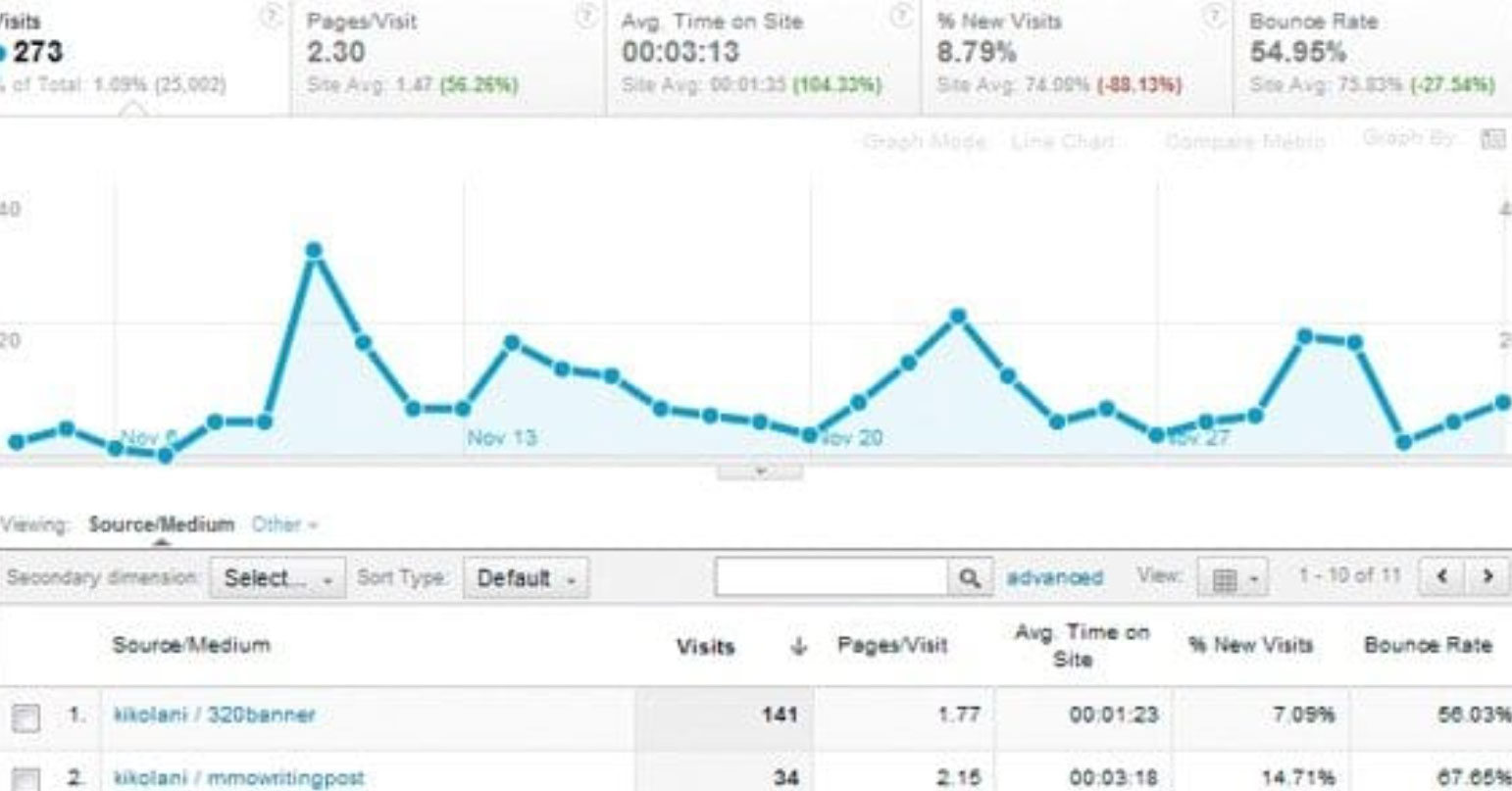
(Image Credit: Growtraffic)
- A strong option for a wider range of industries. If an advertiser is selling a fantasy novel to someone scrolling through Facebook who has a history of purchasing books, they may do well on this platform. At the time someone is scrolling through Facebook, they are looking for entertainment. If a Facebook user sees an advertisement for a coupon to their favorite local restaurant, they are likely to pay attention. But how often are Facebook users like to click on an advertisement for something in the finance industry? Facebook is a place for escape. They may not want to think about their taxes at that moment. When they are looking for tax information, a Google search would be their next likely step. At the same time, someone may perform a Google search for a fantasy novel or information on their local restaurant as well.
The Disadvantages Of Google Ads
- Ads may be very expensive or limited in some industries. While Google Ads has the advantage of being strong in most industries, there are competitive keywords that may cost too much for many advertisers to get involved in.
- The ad options are mostly text based. While most industries can take advantage of strong ad copy, some, like fashion, will do much better with visuals.
The Advantages Of Facebook Ads
- Facebook Ads are a great way to build brand recognition. Many advertisers are familiar with the adage that customers need to see a product seven times before they make a purchase. Many companies find this number to be even higher. With advanced analytics, advertisers can get a detailed look at just how many times a user has touched a product before making a purchase. This number is sometimes closer to fifteen or twenty, let alone the number of times they may have viewed an advertisement. With that in mind, Facebook is a powerful way to build brand recognition and exposure by showing ads to the same audience over time.
- Ads with strong visuals perform well. It is no secret that image and video content do very well online, especially in industries with a strong visual component. Companies that can catch the eye of someone with a beautiful photo of their restaurant, a delicious meal, or the latest trend in fashion will all benefit by the visual elements of Facebook Ads. For instance, bright colors easily catch your attention:
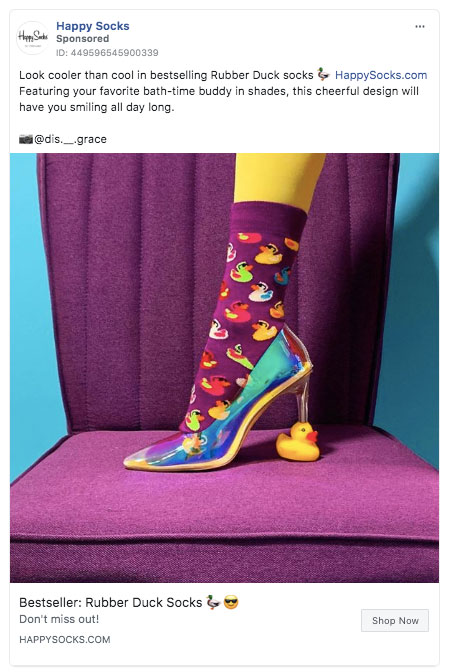
- A lower cost-per-click. There are some industries where the average cost-per-click on Google Ads is above $50. There are keywords that can cost as much as $200 per click. On average, Facebook Ads costs less per click in most industries. It is worth noting that this does not mean Facebook Ads is necessarily going to cost less per conversion. Advertisers will need to test their campaigns and run their numbers to see how their costs average out in the end. For businesses with smaller budgets, Facebook may often be the best solution in the pay-per-click debate.
- The Lookalike audiences feature. For established businesses, the Lookalike feature on Facebook is a big advantage, especially when getting started. With a mailing list of at least 2,000 targeted subscribers, an advertiser can create a list of similar users that make a great starting point. In a similar scenario, advertisers can easily install a Facebook Pixel on their website to create Facebook Ads audiences who have visited their own websites.
We hope that you found this article useful.
If you want to know more interesting about your site health, get personal recommendations and alerts, scan your website by Diib. It only takes 60 seconds.
The Disadvantages Of Facebook Ads
- Some industries will have a difficult time standing out with visual ads. It isn’t easy to sell financial products with photos or videos. Though help can be hired to create creative ads in this area, this can be an extra step that is hard for many to overcome.
- The tool is less advanced than Google Ads. The reports that Facebook offers advertisers are often considered to be less accurate and less useful for moving forward.
The Ultimate Test For FB Ads vs Google Ads
For any kind of advertising campaign, the best way to know is through testing. Once you test your marketing materials on your target audience, using one tool or another, you collect real data that gives answers for how your actual business performs. Not any random advertising campaign–or even how your competition is doing, which would be valuable to know–but your business.
Testing on PPC advertising should last one month. With thirty days of data running ads on both Google and Facebook, you’ll get a clear answer.
At the end of the month, look at your data and ask: Is Facebook or Google Ads better for my marketing money? While information like your cost-per-click will be valuable to know at that point, the bottom line for you will come down to what your cost-per-conversion is. How much money are you spending and how much are you making in return?
While the answer to that question may seem like it is the end of the story, for many advertisers, there will be a next step. It won’t be as simple as investing their advertising budget in only Google Ads or Facebook Ads. Instead, it will be about knowing when to use Facebook vs Google Ads.
Are you looking to build brand recognition with a certain audience? Facebook can be a powerful tool for this. Do you have a strong visual element to your campaign? Facebook Ads excel in this area. Are you looking to grab buyers at the moment they’re searching for a product you sell? Then Google Ads and a strong SEO campaign are powerful ways to make your business available at the right moment.
Diib®: Successful Campaigns On ALL Platforms!
Knowing your business, and understanding these platforms, is the best way to strategically build your campaigns and refine them until you’re getting your best results. Gaining that understanding will come through testing your campaigns and regularly reviewing your results. Knowledge can also be gleaned from software designed to watch all those statistics and metrics for you and notify you about subtle nuances that can affect your ads. Here are some of the features of the Diib dashboard we’re sure you’ll love:
- Social media integration and performance
- Platform specific audience demographics
- Keyword, backlink, and indexing monitoring and tracking tools
- User experience and mobile speed optimization
- Technical SEO monitoring
Click here for your free scan or simply call 800-303-3510 to speak to one of our growth experts.
FAQ’s
If you’re looking to boost sales, leads, consultations or any form of marketing statistic, both platforms would be ideal. That being said, if you’re looking to boost brand awareness or social following, Facebook is the platform for you. If you are in direct sales, Google Ads would be the place to do that.
With the previous article, we’ve more than backed up the statement that Google Ads is worth it. You only pay if people click and your reach is far greater than traditional advertising campaigns.
Google Ads tend to be a bit cheaper than Google Ads. However, that depends largely on your type of business and campaign goals.
As a rule, you want to get between 100-200 clicks on any given keyword to determine whether your ad is doing any good for you; whether it converts. For instance, if you’re going to test 10 keywords with a cost per click of $1, it is recommended you plan on a test budget of $1,000 to $2,000.
Google Ads can give small businesses a leg up on their advertising, IF done correctly. When you precisely and correctly target your audience, PPC or Google Ads are quick to convert your audience. Make sure you back it up with a strong value promise, attractive landing pages, high quality keywords.



